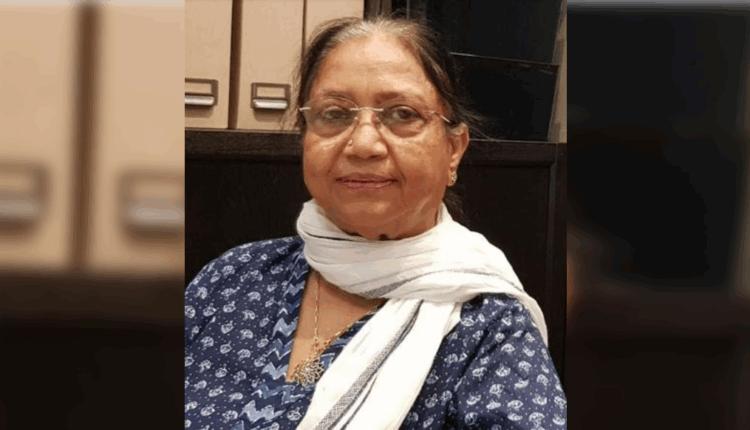
Banu Mushtaq and the power of words
The powerful stories of Banu Mushtaq, whose ‘Heart Lamp’ has been shortlisted for the International Booker Prize 2025, are clear, evocative, personal and political
Banu Mushtaq has broken every stereotype. She was the first to go to university in her family (her mother got married at 12). The first to marry for ‘love’. She defied her family by refusing to accept sitting at home burkha-covered as her in-laws wanted her to. There was no lawyer, journalist and writer before in her family either. At 76, she has burst into the world of English publishing. She is the first Kannada woman writer to be shortlisted for the International Booker Prize 2025 for her short story collection, ‘Heart Lamp’.
“I tried to [take my life] once,” she says over the phone. Her daughter was only three months old. “I was at home. I couldn’t participate in anything.” So, she poured petrol lying in the house on herself. Her husband stopped her just in time. This scene, a desperate act to break free, finds its way into her short story ‘Heart Lamp’, which is a punch in the gut. Mehrun douses herself with kerosene because her husband Inayat is in love with a nurse. She, too, is stopped in time. The parallel runs deeper. Mehrun, like her, had wanted more out of life. She wanted to study, but was married instead. The feeling of being trapped is so vividly captured that it leaps off the page.
Her writing is clear, evocative, personal and political. The stories are powerful, cinematic, heartbreaking — a slice of real life far from pretty, but never bleak. Translated by the gifted Deepa Bhasthi, who won the English PEN Translates Award 2024, Banu’s stories crackle with life. They’re quiet stories chronicling ordinary lives, but the underlying comment on patriarchy is loud. There is a streak of defiance that runs through, one that she echoes in her life. “Women have to obey unquestioningly,” says Banu. “I started to question patriarchy.”
Even writing in Kannada is an act of defiance. Urdu is her mother tongue. “We speak it at home,” she says. But her father wanted her to study and took her to a Kannada medium school. “They said Muslim girls won’t learn Kannada. They gave me six months to learn, or leave,” she says. Banu made it.
Her life would fit perfectly in the stories that she crafts. “I have had only one attempt on my life,” she recalls. A man with a long knife tried to kill her a few years back. He had smashed her car with a hammer before. She was in her office (at home) with junior lawyers when the man burst in to attack her. His back was towards the washroom as they struggled. “My husband emerged from there. He had seen an Akshay Kumar film the night before. He wanted real action,” she laughs. “He stamped his face with his shoes.” This was the second time her husband had saved her.
The “psycho”, as Banu describes him, was jailed. But just as she was to present evidence in front of a judge, her daughter “softened” and asked Banu to let it go. “He told my daughter that he was sorry and wanted to be with his children,” she said. When the case came up for trial, she persuaded her mother to not give evidence. “The judge, who was a woman, was very angry,” she said. Later, Banu explained her position to her in private. The man was released a week later and Banu found him following her. “My husband offered to drive with me. We found him outside our house. He asked if I could give him Rs 600. He had no money,” she laughs. They did. “I meet peculiar people.”
Her stories are threaded with this brand of humour — sharp, witty and rooted in the strangeness of small-town life. The Arabic teacher who loves gobhi manchurian; Nayaz who longs for high-heel shoes that his sister-in-law has got from Saudi in ‘High-Heeled Shoes’; Yusuf who swears that he will get his widowed mother married dressed in a Punjabi suit to upstage his wife.
Her characters are unforgettable. Mehaboob Bi, the silent suffering mother of Yusuf, is hated by her daughter-in-law Akhila because of how close they are. ‘Decision of the Heart’ looks at the saas-bahu relationship with a different twist. In ‘A Taste of Heaven’, Bi Dadi is the great aunt who got married as a child and lost her husband to a snake bite a month later. She spends a colourless life, full of servitude. Till she discovers “ab-e-kausar” Pepsi and stops eating or drinking anything. Or Shaista in ‘Stone Slabs for Shaista Mahal’, the mother of three girls and three boys who wants to get an operation done after her seventh. Her husband Iftikhar and his professed love for her lasts barely 40 days after she dies. He marries again.
“I don’t paint women only white,” Banu says. “They are also scheming.” She writes with empathy though. “Money from the pockets of poor people is just like them, broken, shattered, crumpled, wrinkly, diminished in essence and form,” writes Banu in ‘The Shroud’.
Deepa has accomplished the test of all translators “to write in an English that wasn’t owned by the English”, as Salman Rushdie puts it. It is not easy as Banu speaks Dakhni, Urdu, Arabic and a Kannada that is spoken in Hassan. But Deepa, who is multilingual, found a way to make it work. It’s magic.
Content retrieved from: https://www.tribuneindia.com/news/variety/banu-mushtaq-and-the-power-of-words/.

